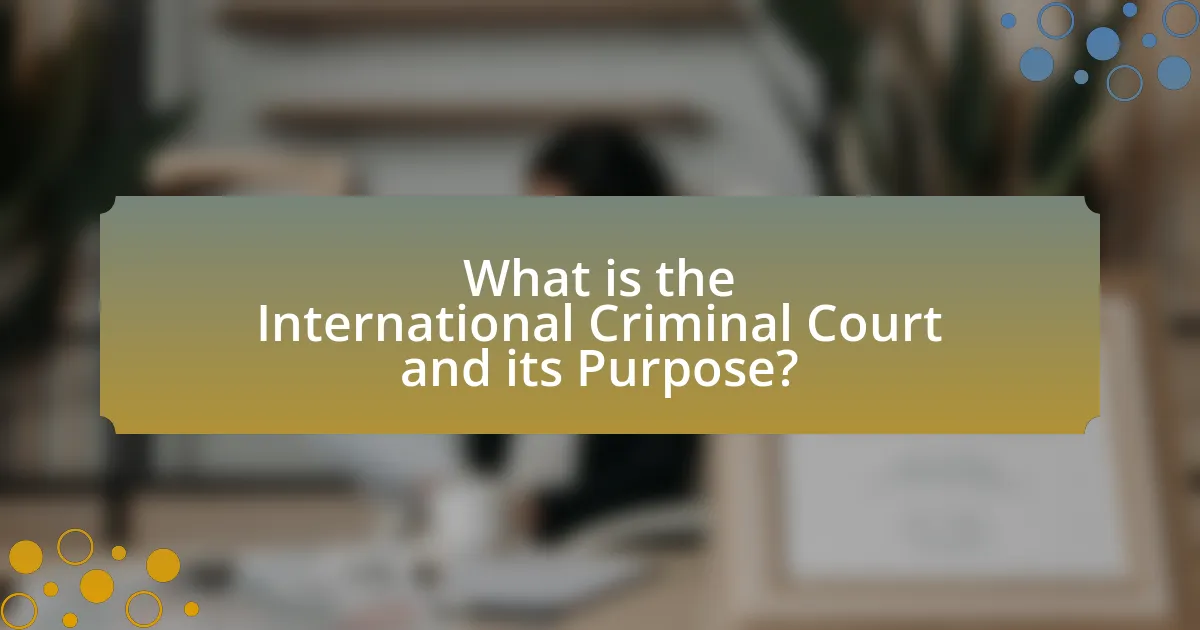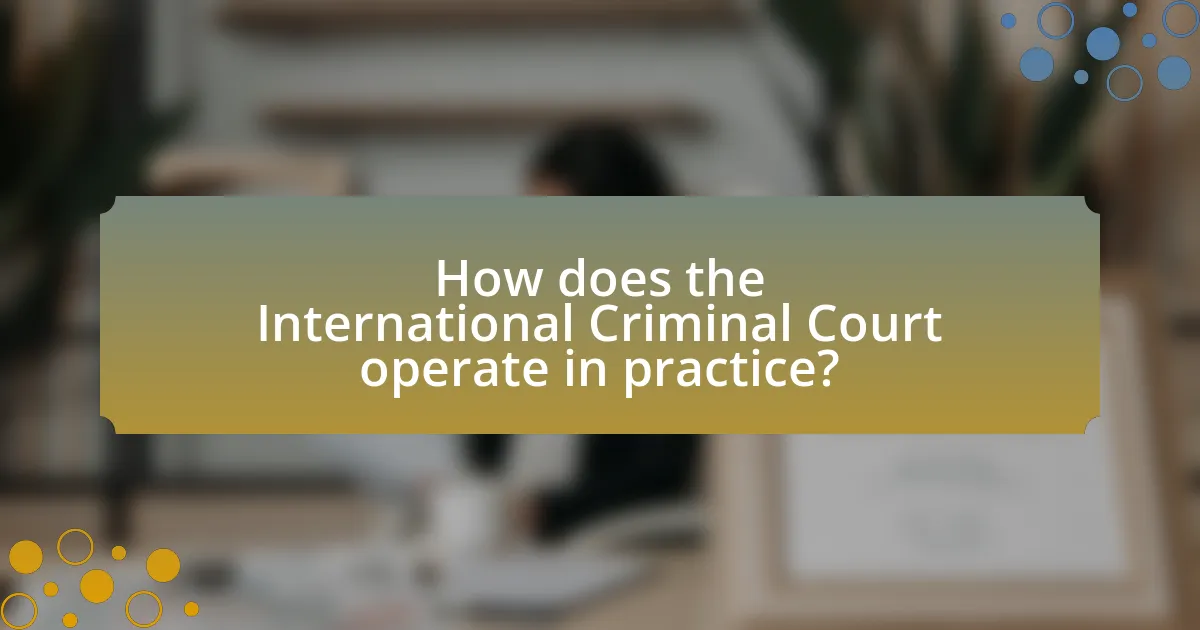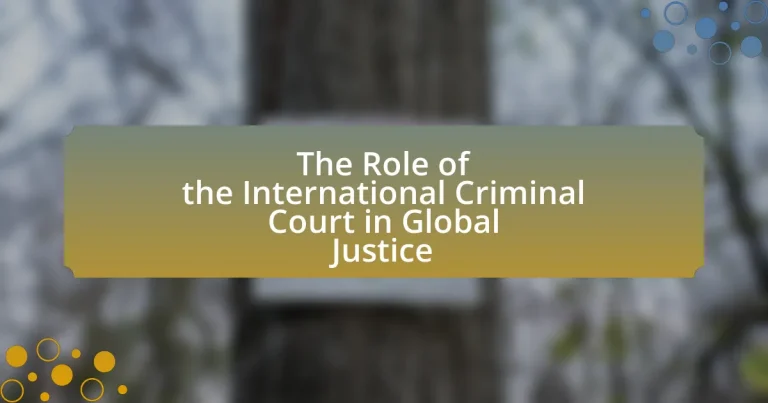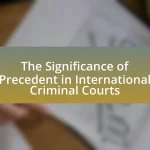The International Criminal Court (ICC) is a permanent international tribunal established to prosecute individuals for serious crimes such as genocide, war crimes, and crimes against humanity, with the aim of promoting accountability and justice globally. Established by the Rome Statute in 2002, the ICC operates under a legal framework that allows it to intervene when national jurisdictions are unable or unwilling to prosecute offenders. The article outlines the ICC’s establishment, its objectives, the types of crimes it addresses, and the challenges it faces, including issues of state cooperation and jurisdictional limitations. Additionally, it discusses the ICC’s operational processes, the rights of defendants, and potential reforms to enhance its effectiveness in the pursuit of global justice.

What is the International Criminal Court and its Purpose?
The International Criminal Court (ICC) is a permanent international tribunal established to prosecute individuals for crimes such as genocide, war crimes, and crimes against humanity. Its purpose is to ensure accountability for serious international offenses and to promote justice and the rule of law globally. The ICC was established by the Rome Statute, which was adopted in 1998 and entered into force in 2002, reflecting the international community’s commitment to end impunity for perpetrators of the most serious crimes.
How was the International Criminal Court established?
The International Criminal Court (ICC) was established through the Rome Statute, which was adopted on July 17, 1998, during a diplomatic conference in Rome, Italy. The statute came into force on July 1, 2002, after receiving ratification from 60 countries, thereby creating the ICC as a permanent institution to prosecute individuals for genocide, war crimes, and crimes against humanity. The establishment of the ICC marked a significant step in international law, aiming to hold accountable those responsible for serious violations of human rights and to promote global justice.
What treaties and agreements led to the formation of the International Criminal Court?
The treaties and agreements that led to the formation of the International Criminal Court (ICC) include the Rome Statute, adopted on July 17, 1998, which established the ICC as a permanent institution to prosecute individuals for genocide, war crimes, and crimes against humanity. The Rome Statute entered into force on July 1, 2002, after receiving the required number of ratifications from states. Additionally, the ICC’s foundation was influenced by earlier agreements such as the Geneva Conventions and the Nuremberg Principles, which laid the groundwork for international criminal law and accountability. These foundational documents collectively underscore the international community’s commitment to addressing serious crimes and ensuring justice on a global scale.
What are the main objectives of the International Criminal Court?
The main objectives of the International Criminal Court (ICC) are to prosecute individuals for serious crimes such as genocide, war crimes, and crimes against humanity. The ICC aims to ensure accountability for perpetrators of these crimes, deter future violations, and promote justice and the rule of law on an international scale. Established by the Rome Statute in 2002, the ICC serves as a court of last resort, intervening only when national jurisdictions are unwilling or unable to prosecute offenders. This framework reinforces the ICC’s role in upholding international humanitarian law and protecting human rights globally.
What types of crimes does the International Criminal Court address?
The International Criminal Court addresses four main types of crimes: genocide, war crimes, crimes against humanity, and the crime of aggression. Genocide involves acts committed with intent to destroy a national, ethnic, racial, or religious group. War crimes refer to serious violations of the laws and customs of war, including the treatment of prisoners of war and the targeting of civilians. Crimes against humanity encompass widespread or systematic attacks against civilian populations, including murder, enslavement, and torture. The crime of aggression involves the planning, preparation, initiation, or execution of acts of aggression by a state against another state. These definitions are established in the Rome Statute, which serves as the foundational treaty of the International Criminal Court.
What constitutes war crimes under the jurisdiction of the International Criminal Court?
War crimes under the jurisdiction of the International Criminal Court (ICC) include serious violations of the laws and customs of war, such as intentionally killing civilians, torturing prisoners of war, and using prohibited weapons. The Rome Statute, which established the ICC, defines these crimes in Article 8, detailing acts like willful killing, taking hostages, and extensive destruction of property not justified by military necessity. These definitions are grounded in international humanitarian law, which aims to protect individuals during armed conflicts and ensure accountability for perpetrators.
How are crimes against humanity defined by the International Criminal Court?
Crimes against humanity are defined by the International Criminal Court (ICC) as specific acts committed as part of a widespread or systematic attack directed against any civilian population. These acts include murder, extermination, enslavement, deportation, and other inhumane acts that intentionally cause great suffering or serious injury to body or mental or physical health. The definition is established in Article 7 of the Rome Statute, which serves as the foundational treaty of the ICC, outlining the jurisdiction and functions of the court. This legal framework ensures accountability for such egregious offenses on an international level.
What is the significance of the International Criminal Court in global justice?
The International Criminal Court (ICC) is significant in global justice as it serves as a permanent tribunal for prosecuting individuals for crimes such as genocide, war crimes, and crimes against humanity. Established by the Rome Statute in 2002, the ICC aims to hold accountable those responsible for serious international offenses, thereby promoting accountability and deterring future crimes. The court’s jurisdiction extends to member states and, in certain cases, non-member states, enhancing its role in the global legal framework. The ICC also contributes to the development of international law and reinforces the principle that no one is above the law, as evidenced by its prosecution of high-profile cases, including those involving political leaders.
How does the International Criminal Court promote accountability for perpetrators?
The International Criminal Court (ICC) promotes accountability for perpetrators by investigating and prosecuting individuals accused of serious international crimes, such as genocide, war crimes, and crimes against humanity. The ICC operates under the Rome Statute, which establishes its jurisdiction and legal framework, allowing it to hold individuals accountable when national courts are unwilling or unable to do so. Since its establishment in 2002, the ICC has issued arrest warrants and conducted trials, thereby reinforcing the principle that individuals, including state leaders, can be held criminally responsible for their actions. This judicial process serves as a deterrent against future crimes and contributes to the establishment of international norms regarding accountability and justice.
What role does the International Criminal Court play in deterring future crimes?
The International Criminal Court (ICC) plays a crucial role in deterring future crimes by holding individuals accountable for serious offenses such as genocide, war crimes, and crimes against humanity. This accountability serves as a deterrent by establishing that perpetrators will face legal consequences, thereby discouraging potential offenders from committing similar acts. The ICC’s existence and its prosecutions signal to states and individuals that the international community prioritizes justice and the rule of law, which can influence behavior and promote compliance with international norms. For instance, the ICC’s interventions in various conflicts have led to increased awareness and discussions about human rights, contributing to a broader culture of accountability.

How does the International Criminal Court operate in practice?
The International Criminal Court (ICC) operates by investigating and prosecuting individuals for serious international crimes such as genocide, war crimes, and crimes against humanity. The ICC functions based on the Rome Statute, which established its legal framework and jurisdiction, allowing it to take action when national courts are unwilling or unable to prosecute offenders.
In practice, the ICC conducts preliminary examinations to assess the validity of allegations, followed by formal investigations if sufficient evidence is found. The Court then issues arrest warrants and conducts trials, ensuring fair proceedings and the rights of the accused are upheld. The ICC relies on cooperation from member states for arrests and evidence gathering, as it does not have its own police force.
Since its establishment in 2002, the ICC has issued over 40 arrest warrants and conducted several high-profile trials, demonstrating its role in holding individuals accountable for international crimes and contributing to global justice.
What is the process for bringing cases before the International Criminal Court?
The process for bringing cases before the International Criminal Court (ICC) involves several key steps. First, the ICC can initiate investigations based on referrals from member states, the United Nations Security Council, or through its own prosecutor’s initiative. Once a situation is referred, the Office of the Prosecutor conducts a preliminary examination to determine if there is a reasonable basis to proceed with an investigation. If sufficient evidence is found, the prosecutor can then open a formal investigation.
Following the investigation, the prosecutor may seek to issue arrest warrants or summonses to appear for individuals suspected of committing crimes under the ICC’s jurisdiction, which includes genocide, war crimes, and crimes against humanity. The cases are then brought before the ICC’s judges, who assess the evidence and determine whether to proceed to trial. This process is governed by the Rome Statute, which established the ICC and outlines its procedures and jurisdiction.
How does the International Criminal Court conduct investigations and prosecutions?
The International Criminal Court (ICC) conducts investigations and prosecutions by initiating cases based on referrals from member states, the United Nations Security Council, or through its own investigations. The ICC’s Office of the Prosecutor gathers evidence, interviews witnesses, and analyzes information to build cases against individuals accused of genocide, war crimes, and crimes against humanity.
The process begins with a preliminary examination to determine if there is a reasonable basis to proceed. If sufficient evidence is found, the Prosecutor can seek authorization from the Pre-Trial Chamber to open a formal investigation. Once an investigation is authorized, the ICC collects evidence and may issue arrest warrants for suspects. Prosecutions occur in the Trial Chamber, where the accused have the right to a fair trial, and the burden of proof lies with the prosecution to establish guilt beyond a reasonable doubt.
This structured approach ensures that investigations and prosecutions adhere to international legal standards, reinforcing the ICC’s role in promoting accountability and justice on a global scale.
What are the rights of defendants in International Criminal Court proceedings?
Defendants in International Criminal Court (ICC) proceedings have several rights designed to ensure fair trial standards. These rights include the presumption of innocence, the right to a fair and public trial, the right to be informed of the charges, the right to legal representation, and the right to present evidence and call witnesses. Additionally, defendants have the right to remain silent and not to testify against themselves, as established by Article 67 of the Rome Statute, which governs the ICC. These rights are crucial for upholding the principles of justice and ensuring that defendants can adequately defend themselves against serious charges such as genocide, war crimes, and crimes against humanity.
What challenges does the International Criminal Court face in its operations?
The International Criminal Court (ICC) faces significant challenges in its operations, including issues of state cooperation, limited jurisdiction, and resource constraints. State cooperation is critical for the ICC to execute arrest warrants and gather evidence, yet many countries, including some that are party to the Rome Statute, have failed to comply with its requests. Limited jurisdiction restricts the ICC to prosecuting only the most serious crimes, such as genocide and war crimes, which can lead to gaps in accountability for other serious human rights violations. Additionally, the ICC often operates with insufficient funding and resources, which hampers its ability to conduct thorough investigations and prosecutions. These challenges undermine the ICC’s effectiveness in promoting global justice and accountability.
How does state cooperation impact the effectiveness of the International Criminal Court?
State cooperation significantly enhances the effectiveness of the International Criminal Court (ICC) by facilitating the arrest and prosecution of individuals accused of serious crimes. When states actively cooperate with the ICC, they provide essential support such as arresting suspects, gathering evidence, and enforcing court decisions. For instance, the ICC’s ability to prosecute individuals for war crimes, genocide, and crimes against humanity relies heavily on the cooperation of member states to execute arrest warrants, as seen in cases like the arrest of former Congolese warlord Thomas Lubanga in 2012. Without such cooperation, the ICC faces challenges in enforcing its mandates, leading to limited accountability for perpetrators and undermining its role in promoting global justice.
What are the criticisms regarding the International Criminal Court’s jurisdiction?
Criticisms regarding the International Criminal Court’s jurisdiction include its perceived bias, limited reach, and issues with state cooperation. Critics argue that the ICC disproportionately targets African nations, as evidenced by the majority of its cases originating from the continent, which raises concerns about fairness and impartiality. Additionally, the court’s jurisdiction is limited to crimes committed in member states or by nationals of member states, excluding significant global powers like the United States and China, which undermines its universality. Furthermore, the ICC often relies on the cooperation of states for arrests and evidence, leading to challenges in enforcing its mandates, as seen in cases where indicted individuals remain at large due to lack of state support.

What is the future of the International Criminal Court in global justice?
The future of the International Criminal Court (ICC) in global justice is likely to involve increased scrutiny and calls for reform, as it faces challenges in enforcement and state cooperation. The ICC has been criticized for its perceived bias and limited jurisdiction, which affects its ability to prosecute high-profile cases effectively. For instance, only a fraction of the world’s nations are signatories to the Rome Statute, limiting the court’s reach. Additionally, geopolitical tensions and the rise of non-cooperation from powerful states, such as the United States and Russia, further complicate its role. These factors suggest that while the ICC remains a crucial institution for addressing war crimes and crimes against humanity, its effectiveness may depend on reforms that enhance its legitimacy and operational capacity.
How can the International Criminal Court evolve to address contemporary issues?
The International Criminal Court (ICC) can evolve to address contemporary issues by enhancing its jurisdiction to include crimes such as environmental destruction and cyber warfare. This evolution is necessary as these crimes increasingly impact global stability and human rights. For instance, the ICC’s Rome Statute currently does not explicitly cover environmental crimes, despite the growing recognition of their significance in international law and human rights discourse. Additionally, adapting procedural mechanisms to allow for more efficient investigations and prosecutions, such as utilizing technology for evidence collection and remote testimonies, can improve the ICC’s responsiveness to contemporary challenges. These adaptations would align the ICC’s mandate with the evolving nature of conflict and crime in the 21st century, ensuring its relevance and effectiveness in promoting global justice.
What reforms are being proposed to enhance the International Criminal Court’s effectiveness?
Proposed reforms to enhance the International Criminal Court’s effectiveness include increasing state cooperation, improving the efficiency of case processing, and expanding the Court’s jurisdiction. Increased state cooperation is essential for the ICC to secure arrests and gather evidence, as demonstrated by the limited success in apprehending indicted individuals. Improving case processing efficiency can be achieved by streamlining procedures and reducing delays, which have hindered timely justice in past cases. Expanding jurisdiction to include crimes such as environmental destruction and cybercrime would allow the ICC to address contemporary global issues, thereby enhancing its relevance and authority in international law. These reforms aim to strengthen the ICC’s capacity to fulfill its mandate of prosecuting serious international crimes effectively.
How can the International Criminal Court strengthen its relationship with member states?
The International Criminal Court can strengthen its relationship with member states by enhancing communication and collaboration on legal matters. By actively engaging in dialogue with member states, the Court can address concerns, clarify its processes, and foster a sense of shared responsibility in upholding international justice. For instance, the ICC has previously organized outreach programs to educate member states about its functions and the importance of cooperation, which has led to increased support and participation in investigations. Additionally, the Court can offer technical assistance and capacity-building initiatives to help member states improve their domestic legal frameworks, thereby reinforcing their commitment to international law and the ICC’s mandate.
What practical steps can individuals take to support the International Criminal Court?
Individuals can support the International Criminal Court (ICC) by advocating for its mandate and promoting awareness of its work. Advocacy can include engaging in discussions about international justice, sharing information on social media, and participating in campaigns that highlight the importance of accountability for war crimes and crimes against humanity.
Additionally, individuals can contribute by joining or supporting organizations that work to strengthen the ICC, such as the Coalition for the International Criminal Court, which focuses on enhancing the court’s effectiveness and outreach. Supporting legislation that funds and empowers the ICC is another practical step, as government support is crucial for the court’s operations.
Moreover, attending public events, seminars, or webinars related to the ICC can help raise awareness and foster community engagement around international justice issues. By taking these actions, individuals can play a vital role in reinforcing the ICC’s mission and ensuring that it remains a key player in global justice.
How can advocacy and awareness contribute to the goals of the International Criminal Court?
Advocacy and awareness significantly contribute to the goals of the International Criminal Court (ICC) by promoting understanding and support for international justice. Increased advocacy efforts can lead to greater public engagement, which in turn pressures governments to cooperate with the ICC and uphold international law. For instance, campaigns that highlight the importance of accountability for war crimes and crimes against humanity can mobilize civil society and influence policy decisions. Furthermore, awareness initiatives can educate individuals about the ICC’s mandate, fostering a culture of accountability and deterring future atrocities. This is evidenced by the ICC’s reliance on state cooperation and public support to effectively prosecute offenders and fulfill its mission of delivering justice globally.
What role do non-governmental organizations play in supporting the International Criminal Court?
Non-governmental organizations (NGOs) play a crucial role in supporting the International Criminal Court (ICC) by advocating for justice, raising awareness about international crimes, and providing critical information and resources. NGOs such as Human Rights Watch and Amnesty International engage in monitoring human rights violations, documenting evidence, and mobilizing public opinion to hold perpetrators accountable. Their reports and findings often serve as vital evidence in ICC investigations, enhancing the court’s ability to prosecute cases effectively. Additionally, NGOs contribute to the ICC’s outreach efforts, educating communities about the court’s functions and the importance of international justice, thereby fostering greater public support for the ICC’s mission.


